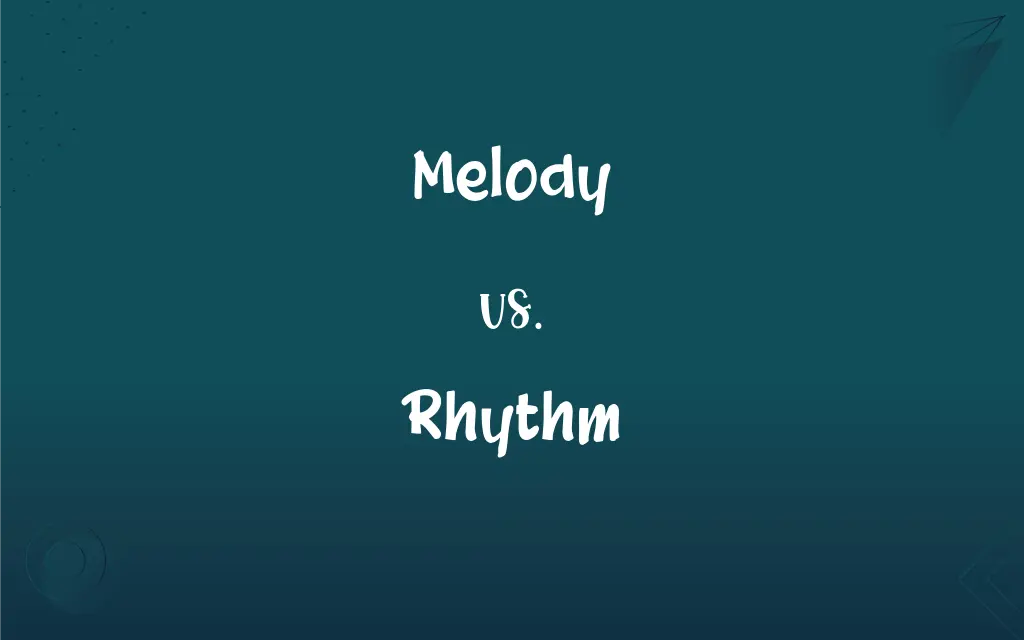Melody vs. Rhythm: What's the Difference?
Edited by Aimie Carlson || By Janet White || Published on January 15, 2024
Melody is a sequence of musical notes that are musically satisfying, forming the tune, while rhythm is the pattern of beats in time, creating the tempo and groove.

Key Differences
Melody refers to a series of musical notes arranged in succession to form a distinct, harmonious tune. Rhythm, on the other hand, involves the timing of musical sounds and silences to create a pattern.
A melody is typically what is hummed or sung and can be the most memorable aspect of a song. Rhythm is the underlying beat that dictates the pace and movement of the music.
Melodies are composed using various pitches and intervals, creating the musical theme or idea. Rhythms are created using a combination of different note durations and rests, defining the tempo and feel of the piece.
In music, the melody often carries the emotional and thematic content of the piece. Rhythm provides the structure and foundation, supporting and complementing the melody.
Melodies can be lyrical, capturing the essence of the song's story or emotion. Rhythm, serving as the song's backbone, can influence the genre and energy, like the difference between a slow ballad and an upbeat dance track.
ADVERTISEMENT
Comparison Chart
Definition
Series of musical notes forming a satisfying tune
Pattern of beats and timing in music
Role in Music
Carries the tune and emotional content
Dictates the pace and movement
Composition
Created using pitches and intervals
Created using note durations and rests
Emotional Contribution
Conveys the song's emotion and theme
Influences the mood through tempo and groove
Variation
Can vary in pitch, length, and complexity
Varies in tempo, beat division, and pattern
ADVERTISEMENT
Melody and Rhythm Definitions
Melody
Often the most memorable part of a song.
The melody lingered in my mind long after the concert ended.
Rhythm
Dictates the tempo and groove of a song.
The rhythm had everyone tapping their feet.
Melody
Can be lyrical or instrumental.
The piano's melody added a haunting quality to the piece.
Rhythm
The pattern of beats in a piece of music.
The rhythm of the drumbeat set the song's energetic pace.
Melody
A sequence of notes that are perceived as a single entity.
The song's melody was catchy and easy to remember.
Rhythm
Involves the arrangement of sounds and silences.
The rhythm's complexity gave the music a captivating quality.
Melody
The main theme of a piece of music.
The melody of the symphony was both complex and beautiful.
Rhythm
Forms the backbone of a musical composition.
The consistent rhythm provided a solid foundation for the improvisation.
Melody
Varies in pitch and rhythm to create musical interest.
The melody's rise and fall perfectly captured the song's emotion.
Rhythm
Can be regular or syncopated, influencing the style.
The jazz piece's rhythm was richly syncopated.
Melody
A pleasing succession or arrangement of sounds.
Rhythm
Movement or variation characterized by the regular recurrence or alternation of different quantities or conditions
The rhythm of the tides.
Melody
Musical quality
The melody of verse.
Rhythm
The patterned, recurring alternations of contrasting elements of sound or speech.
FAQs
Is rhythm necessary in all music?
Yes, rhythm is a fundamental element in music, providing the temporal framework.
What is a melody in music?
A melody is a sequence of notes forming a tuneful and harmonious line or tune in music.
How do melodies convey emotion in music?
Melodies use pitch, intervals, and phrasing to express emotions and themes.
How is rhythm defined in music?
Rhythm is the pattern of beats and timing, creating the structure and pace of the music.
What role does rhythm play in different music genres?
Rhythm helps define genres; for example, a steady rhythm is key in rock, while complex rhythms are characteristic of jazz.
Can the melody and rhythm be the same?
They are distinct elements; melody is about note sequences, while rhythm is about timing and beats.
What instruments are typically used for rhythm?
Drums, percussion, and bass are commonly used for establishing rhythm.
How do beginners learn rhythm?
Beginners often start with basic beat patterns and gradually learn more complex rhythms.
How do composers create melody?
Composers create melodies by arranging musical notes and intervals in a creatively satisfying sequence.
Does melody depend on rhythm?
While independent, melody often interacts with rhythm to create a cohesive musical piece.
Can a song exist without a melody?
While unusual, some music, like certain types of electronic or percussive pieces, may not have a distinct melody.
Can melodies be rhythmically complex?
Yes, melodies can have complex rhythmic patterns, adding to their expressiveness.
Are all melodies lyrical?
Not all; melodies can be purely instrumental as well.
Do melodies change within a song?
Yes, melodies can vary within a song, especially in different sections like verses and choruses.
How do rhythm changes affect a song?
Changing the rhythm can alter the song's mood, energy, and style.
Can rhythm alone convey a song's mood?
Rhythm can strongly influence a song's mood, but usually in conjunction with melody and harmony.
What makes a good melody?
A good melody is memorable, emotionally expressive, and fits well with the song's harmony and rhythm.
Is rhythm linked to the tempo of a song?
Yes, rhythm directly influences the tempo or speed of a song.
How do you identify a song's melody?
The melody is usually the most prominent, tuneful line that you might hum or sing along to.
What is syncopation in rhythm?
Syncopation is a rhythmic technique where beats are accented in unexpected places, creating a dynamic rhythm.
About Author
Written by
Janet WhiteJanet White has been an esteemed writer and blogger for Difference Wiki. Holding a Master's degree in Science and Medical Journalism from the prestigious Boston University, she has consistently demonstrated her expertise and passion for her field. When she's not immersed in her work, Janet relishes her time exercising, delving into a good book, and cherishing moments with friends and family.
Edited by
Aimie CarlsonAimie Carlson, holding a master's degree in English literature, is a fervent English language enthusiast. She lends her writing talents to Difference Wiki, a prominent website that specializes in comparisons, offering readers insightful analyses that both captivate and inform.


































































